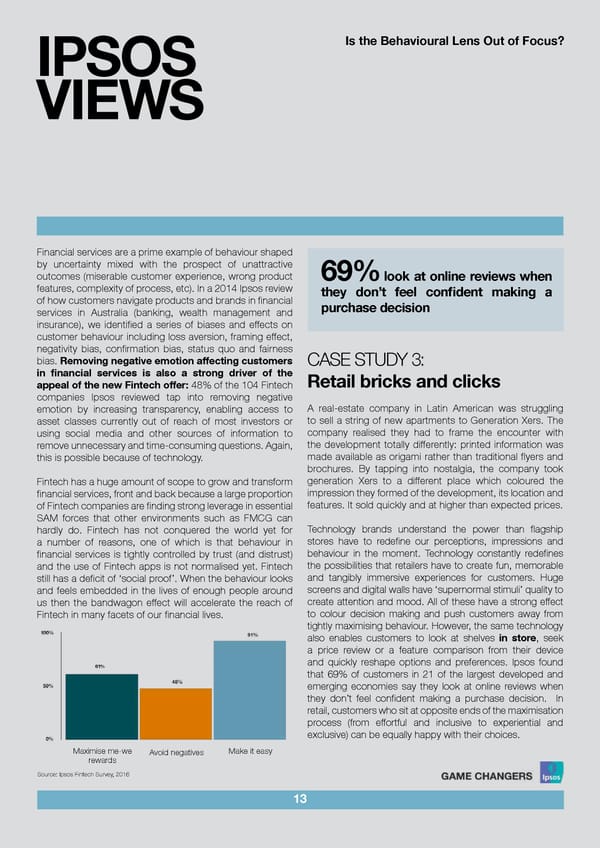IPSOS Is the Behavioural Lens Out of Focus? VIEWS Financial services are a prime example of behaviour shaped by uncertainty mixed with the prospect of unattractive outcomes (miserable customer experience, wrong product 69% look at online reviews when features, complexity of process, etc). In a 2014 Ipsos review they don’t feel confident making a of how customers navigate products and brands in financial purchase decision services in Australia (banking, wealth management and insurance), we identified a series of biases and effects on customer behaviour including loss aversion, framing effect, negativity bias, confirmation bias, status quo and fairness bias. Removing negative emotion affecting customers CASE STUDY 3: in financial services is also a strong driver of the Retail bricks and clicks appeal of the new Fintech offer: 48% of the 104 Fintech companies Ipsos reviewed tap into removing negative emotion by increasing transparency, enabling access to A real-estate company in Latin American was struggling asset classes currently out of reach of most investors or to sell a string of new apartments to Generation Xers. The using social media and other sources of information to company realised they had to frame the encounter with remove unnecessary and time-consuming questions. Again, the development totally differently: printed information was this is possible because of technology. made available as origami rather than traditional flyers and brochures. By tapping into nostalgia, the company took Fintech has a huge amount of scope to grow and transform generation Xers to a different place which coloured the financial services, front and back because a large proportion impression they formed of the development, its location and of Fintech companies are finding strong leverage in essential features. It sold quickly and at higher than expected prices. SAM forces that other environments such as FMCG can hardly do. Fintech has not conquered the world yet for Technology brands understand the power than flagship a number of reasons, one of which is that behaviour in stores have to redefine our perceptions, impressions and financial services is tightly controlled by trust (and distrust) behaviour in the moment. Technology constantly redefines and the use of Fintech apps is not normalised yet. Fintech the possibilities that retailers have to create fun, memorable still has a deficit of ‘social proof’. When the behaviour looks and tangibly immersive experiences for customers. Huge and feels embedded in the lives of enough people around screens and digital walls have ‘supernormal stimuli’ quality to us then the bandwagon effect will accelerate the reach of create attention and mood. All of these have a strong effect Fintech in many facets of our financial lives. to colour decision making and push customers away from tightly maximising behaviour. However, the same technology also enables customers to look at shelves in store, seek a price review or a feature comparison from their device and quickly reshape options and preferences. Ipsos found that 69% of customers in 21 of the largest developed and emerging economies say they look at online reviews when they don’t feel confident making a purchase decision. In retail, customers who sit at opposite ends of the maximisation process (from effortful and inclusive to experiential and exclusive) can be equally happy with their choices. Maximise me-we Avoid negatives Make it easy rewards Source: Ipsos Fintech Survey, 2016 13
 Is the Behavioural Lens Out of Focus? Page 14 Page 16
Is the Behavioural Lens Out of Focus? Page 14 Page 16